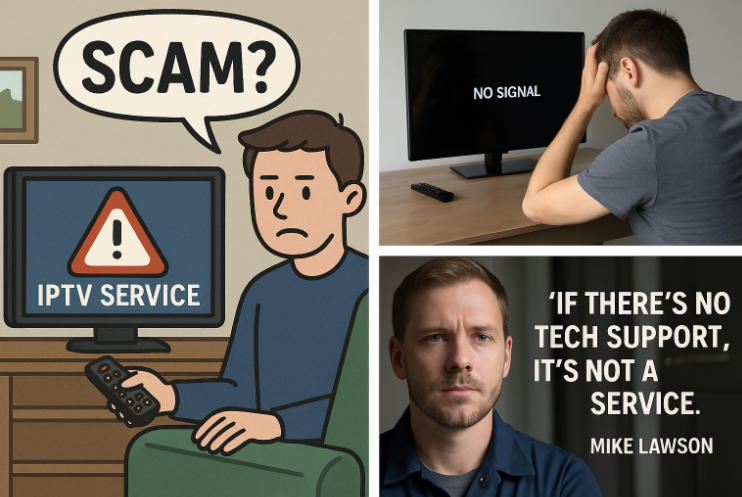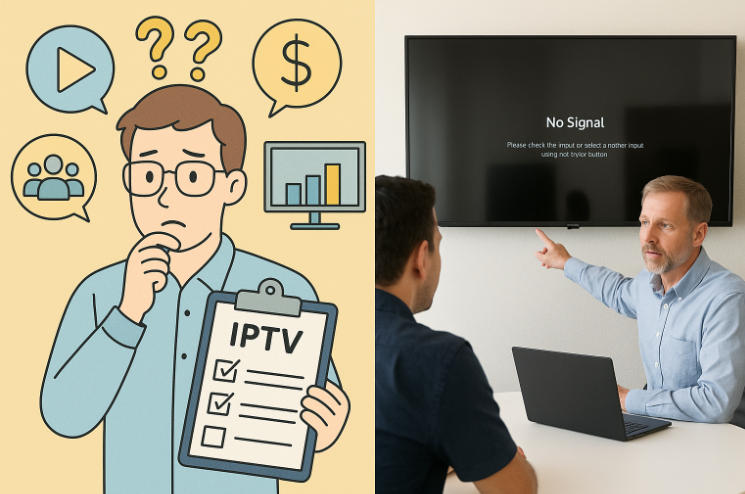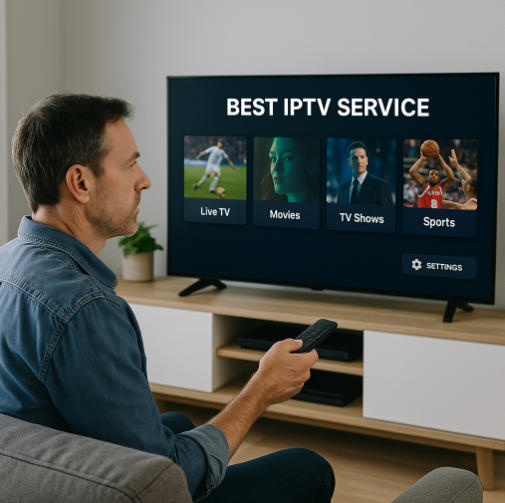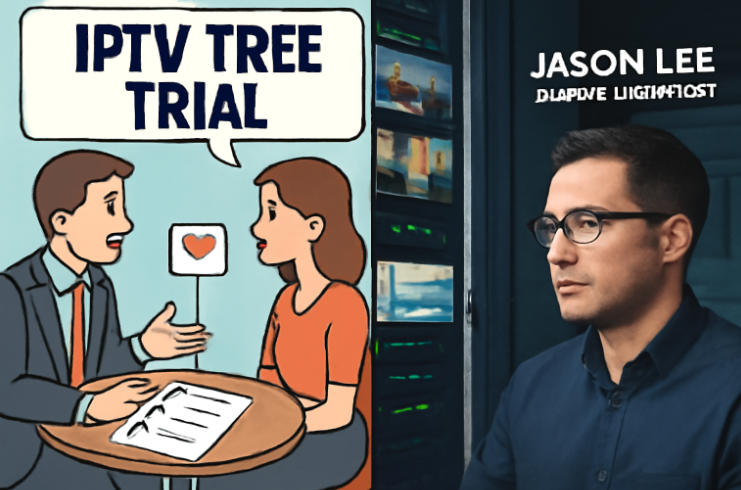You’ve probably seen the ads—“Thousands of channels for just $10/month!” Sounds like a steal, right? But picking the best IPTV service these days can feel like trying to spot the real deal at a flea market: some gems, a lot of junk, and a few scams waiting to take your cash.
A buddy of mine thought he hit the jackpot—great price, tons of channels. Two weeks in? Black screen. No support, no refund. That’s the mess too many folks run into when they don’t know what to look for.
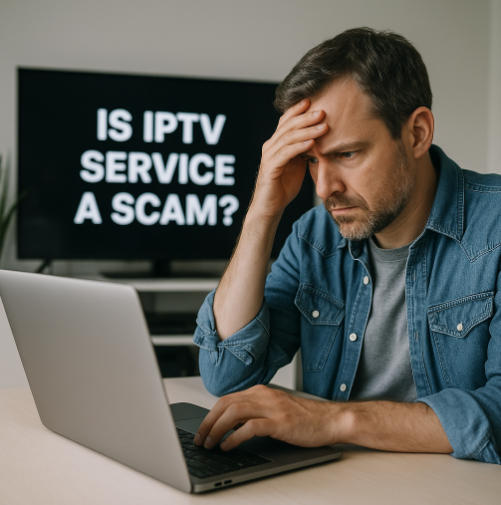
As Star IPTV engineer Mike Lawson puts it: “If there’s no tech support, it’s not a service. It’s a gamble.”
This article’s your safety net. We're breaking down red flags, showing what makes a provider worth your trust, and giving real fixes for streaming headaches like buffering and bad connections. If you want a quick way to test a reputable service while you read, try an IPTV free trial from a known provider.
Let’s kick things off with the biggest question—how can you tell if an IPTV service is a scam?
4 steps to spot IPTV service scams
Worried you're walking into an IPTV trap? Let's break down the signs of a scam before you hand over your credit card.
Is that “free trial” too good to be true?
Not all “free trials” are created equal—some are booby traps with fine print trickery. Here’s how to spot the shady ones:
Free trial that requires a credit card? That’s a big red flag. The FTC’s guidance on trials and auto-renewals explains the risks of “negative option” subscriptions—read their tips before you sign up: FTC: free trials & auto-renewals.
Trial periods less than 48 hours often signal a bait-and-switch tactic.
Hidden fees pop up after the trial ends, even if you cancel “on time.”
Suspicious terms like “auto-renew without notice” often lurk in the fine print.
Quick rule of thumb? If it feels rushed, pushy, or too generous, it probably is. Prefer transparent providers that clearly list options like IPTV subscription plans and simple cancellations up front.
Red flags in monthly plan pricing models
Too-good-to-be-true pricing? Here's how scammers lure you in with sketchy monthly plans:
| Red Flag | What It Means | Scam Signal | Action to Take |
|---|---|---|---|
| $2.99 monthly fee | Far below market average | Possible scam | Compare with competitors |
| No billing history | Can't track what you paid for | Zero transparency | Avoid & report |
| Payment in crypto | Hard to trace & refund | Risk of fraud | Use credit card or PayPal |
| Locked-in pricing | Auto-renews at higher price | Classic trap | Read the contract closely |
Watch out for providers who hike prices without notifying you, or bury terms in 10 pages of fine print. A clear, public breakdown like IPTV Packages is a trust signal.
Unverified IPTV apps on Smart TVs and streaming devices
Installing shady apps is like leaving your front door wide open. Many IPTV scams sneak in through unverified third-party apps, often side-loaded onto Smart TVs or streaming devices. These apps don’t come from verified app stores and often skip software security checks. Google’s security team reports significantly higher malware rates from internet-sideloaded sources versus apps on Google Play—see Google’s note on strengthening Android protections: Android security: higher malware in internet-sideloaded apps. Also note Google’s upcoming identity verification for sideloaded apps aimed at curbing scams: news on sideloading changes.
Once installed, unverified apps can snoop into your device, exposing your account details—or worse, your network. If the app doesn’t update regularly or lacks a legit publisher, consider it a malware risk. Always check if the app is listed on your device’s official store and steer clear of APKs from random websites. Authorities also warn about “dodgy boxes” and illicit IPTV: see FACT UK’s consumer warning on malware and legal risk: FACT: dangers of illegal IPTV.
Check customer service and technical support responsiveness
Reliable customer support is like a smoke alarm—you hope you never need it, but when you do, it better work fast. Here's what to check:
Response Time: Can you get help within 24 hours? If it takes 3 days, imagine waiting that long during a live sports blackout.
Contact Methods: Reputable services offer live chat, email, and often phone support. Scam services? Just an empty “Contact Us” form.
Problem Resolution: Are issues fixed or just “noted”? Check user reviews to see how they handle real problems.
Support Channels: Look for a healthy community forum, updated FAQs, and technical guides like a public IPTV setup guide and “What is IPTV” resources.
“At Star IPTV, we guarantee real-time live chat support because when you're streaming the Champions League final, every second counts.” — Carlos Mendez, Star IPTV Support Lead, 2024 Interview
Support isn’t just about fixing stuff—it’s a trust signal. If a provider disappears when you have a question, that’s your answer.
What makes a provider trustworthy?
Trust isn’t just a marketing term—it’s something users feel when they’re not second-guessing every click or payment. Let's unpack what truly builds that confidence.
Transparent subscription fees and refund policies
Not all IPTV pricing is shady, but the shady ones usually hide behind vague terms. Here’s how to spot the trustworthy ones before you commit:
Look for clear pricing breakdowns—monthly plans, annual options, and exact feature sets. No fuzz. Transparent pages like IPTV subscription help you compare.
A visible refund policy (ideally within 7 or 14 days) speaks volumes about a provider’s confidence in their service. The FTC also outlines best practices for subscriptions and cancellations—good providers follow them: FTC: free trials & auto-renewals.
Check if the cancellation process is simple, preferably a one-click option through your account dashboard.
Watch for hidden charges buried under “activation fees” or “special access add-ons.”
Pro tip: If a service doesn’t openly list its subscription fees or glosses over cancellation terms, that’s a giant waving red flag.

Availability of EPG, Cloud DVR, and Catch-up TV
When you subscribe to an IPTV service, you're not just paying for channels—you're paying for how smartly you can access them. Here's what to check:
📍 EPG Availability
Look for services that offer a full Electronic Program Guide—not a partial one. You should be able to scroll ahead by days, not just hours. If you’re new, skim What is IPTV for a plain-English overview.
📍 Cloud DVR
Can you record shows to the cloud and watch them later? If not, you're missing a huge convenience.
📍 Catch-up TV
This feature lets you go back and rewatch content aired in the last 7–14 days.
📍 Bonus Add-On
Some services bundle on-demand content into this trio. See how reputable providers explain features and pricing on their IPTV Packages page.
Reviews from active community forums and troubleshooting guides
What are real users saying—and how helpful is the provider when stuff breaks?
Community Reviews: Skip homepage testimonials. Head to Reddit, IPTV forums, or Trustpilot for real feedback.
User Forums & Guides: The best IPTV platforms publish live IPTV streaming tips and a clean IPTV setup guide.
Support Resources: Look for accessible FAQs, email support, or even live chat. Bonus points for YouTube tutorials or mobile app walkthroughs.
Quick Trust Indicator Table
| Provider Name | Active Forums | Troubleshooting Guides | Response Time | User Rating (1–5) |
|---|---|---|---|---|
| StreamZen | ✅ Yes | ✅ Full library | ⏱️ ~6 hrs | ⭐⭐⭐⭐☆ (4.2) |
| FlexIPTV | ❌ No | ❌ Minimal | ❌ Slow (24 hrs) | ⭐⭐☆☆☆ (2.5) |
| MaxTV Pro | ✅ Yes | ✅ Video guides | ⏱️ ~3 hrs | ⭐⭐⭐⭐⭐ (4.8) |
A provider’s reputation lives and dies by the support it offers when things go wrong—and how actively it listens to its users.
Connectivity drops? Improve stability with wired connection
Wired connection vs. Wi-Fi: When stability matters
Wired and wireless connections both have their perks, but one wins when it comes to IPTV stability. Here's a breakdown based on what really matters.
Reliability
Ethernet cables offer consistent, uninterrupted streaming—no surprises. (See: Why wired reduces buffering from Wowza: wired vs. Wi-Fi for streaming)
Wi-Fi often gets flaky with walls, distance, or interference from other gadgets. Independent guides also agree Ethernet gives lower latency and more consistency: HighSpeedInternet: Ethernet vs. Wi-Fi.
Latency
Wired connections typically reduce latency, which helps with smooth live TV playback.
Signal Interference
Wi-Fi is vulnerable to interference from microwaves, phones, even fish tanks.
Real-World Streaming Tip
If you're using IPTV for 4K content or live sports, Ethernet is your best friend. For casual TV shows or music channels on your phone, Wi-Fi is fine—just stay close to your router. If you need help optimizing devices, follow the IPTV setup guide.
How bandwidth and data usage affect streaming quality
Streaming IPTV smoothly? It depends on more than just "fast internet." Let’s look at how bandwidth and usage impact what you actually see.
Table: Streaming Requirements vs. Bandwidth Realities
| Streaming Type | Min Bandwidth (Mbps) | Avg Data Usage/Hour | Risk of Buffering |
|---|---|---|---|
| SD (Standard Def.) | 3 | ~0.7 GB | Low |
| HD (High Def.) | 5 | ~1.5 GB | Medium |
| 4K Streaming | 15–25 | ~7 GB | High |
For reference, Netflix recommends 3 Mbps (720p), 5 Mbps (1080p), and 15 Mbps (4K) and notes up to 0.7 GB/hour (SD) and higher for HD/UHD: Netflix speeds and Netflix data per hour.
Also keep in mind some ISPs enforce data caps or throttle heavy users, which can tank stream quality: FCC on data caps.
Pro tip: If you binge news or sports daily, consider an unlimited plan—or a provider that explains performance fundamentals in plain English (see IPTV streaming).
Devices that perform best under weak network conditions
When the signal sucks, not all devices suffer equally. Some hold up surprisingly well.
Quick-Win Setup Tips:
Use low-latency devices like dedicated streaming sticks instead of older Smart TVs.
Add network adapters to gaming consoles for wired reliability.
Use mesh Wi-Fi to spread signal evenly across your home.
Short Burst Tips
Mobile devices usually perform better with dual-band Wi-Fi support.
Tablets and smartphones with newer antennas (Wi-Fi 6) can buffer less even under pressure.
Range extenders help in large houses, but quality varies—stick with trusted brands.
Real Talk: If you’re in a dead zone, don’t fight it. Just run a long Ethernet cable and enjoy uninterrupted access to your best IPTV service.
Buffering frustrations? Switch to a reliable service
Key role of video resolution and frame rate in smooth playback
Let’s break it down: your visual experience lives or dies by two things—video resolution and frame rate. Here's how they team up for buttery-smooth playback:
High video resolution (like 1080p or 4K) means sharper image details, but it demands more from your internet and device.
Frame rate (measured in fps) controls how fluid motion appears. 60fps is smoother than 30fps, especially for action-packed sports or movies.
An inconsistent refresh rate or overloaded connection? Boom, buffering.
For casual users, 720p at 30fps often works fine—but if you want that cinema feel, 1080p at 60fps is the sweet spot.
Stable visuals aren’t just tech specs—they’re about streaming without frustration.
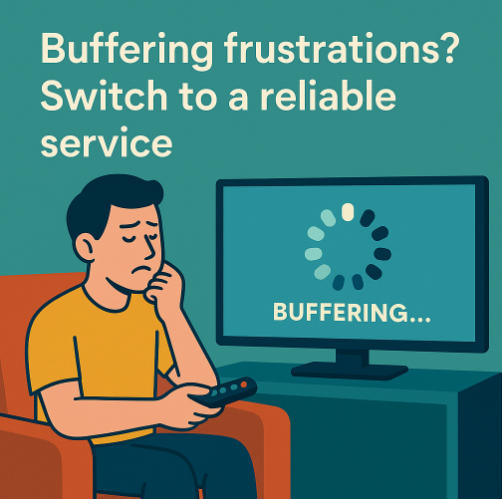
How IPTV services handle 4K streaming and HDR support
4K and HDR sound sexy, but not every IPTV service can handle them without hiccups. One thing to look for is whether a provider uses a Content Delivery Network (CDN) to cache content closer to you, which reduces latency and buffering: What is a CDN? (Akamai) and How CDNs reduce buffering.
| IPTV Service | 4K Streaming Support | HDR Support | Buffer-Free Experience |
|---|---|---|---|
| StreamNova | ✅ Yes | ✅ Yes | ⭐⭐⭐⭐☆ |
| CrystalVision | ✅ Yes | ❌ No | ⭐⭐⭐☆☆ |
| Star IPTV | ✅ Yes | ✅ Yes | ⭐⭐⭐⭐⭐ |
| BudgetCast | ❌ No | ❌ No | ⭐⭐☆☆☆ |
Takeaway: Not all “premium” services deliver high-end visuals consistently. Prefer providers that openly describe their infrastructure and plan tiers (see IPTV Packages).
Optimizing your setup for consistent audio quality
Use HDMI 2.1 or optical audio for solid sync between video and sound.
Check your IPTV app’s audio codecs—AAC and Dolby Digital are safer bets.
Invest in a basic home theater system or quality soundbar.
Make sure your streaming box or Smart TV supports consistent sound processing across content types.
For new users, the IPTV setup guide walks through device prep and app settings.
Best IPTV service options with minimal buffering
Start with a free trial—real-time testing beats flashy ads. A transparent option is here: IPTV free trial.
Check real reviews—look for keywords like “buffer-free”, “lag-free”, and “no freezing”.
Prioritize services that offer CDN-based streaming—they distribute content better (see CDN basics).
Avoid overloaded providers—if they serve too many users at once, performance tanks.
Don’t chase the cheapest IPTV—you’ll end up paying in frustration.
Streaming stability in live TV channels vs. on-demand content
Live streams freeze more. On-demand is often smoother. Why? Live TV requires real-time packet delivery; there’s less buffer cushion than with VOD. Technical primers explain the difference between VOD and Live streaming workflows and why live is tougher to get right under load: VOD vs. Live explained. Choose services that invest in dedicated infrastructure for live events.
Live TV relies heavily on network stability and real-time encoding. Even slight bandwidth dips cause choppy playback.
VOD (Video on Demand) content is pre-buffered and plays from local caches, making it more stable even on slower networks.
Improving IPTV performance on smartphones and tablets
Want smooth IPTV performance on your phone or tablet during your commute or late-night binge? Here's a multi-angle approach:
🟡 Device Compatibility
Older phones struggle with 1080p. Stick to HD if your hardware's dated.
🟡 App Optimization
Choose IPTV apps specifically optimized for Android or iOS. Avoid sketchy APKs—again, see Google’s warning about sideloaded malware rates: Android security note.
🟡 Network Adaptability
Mobile streaming relies heavily on Wi-Fi connection quality. If you're on 4G or 5G, use data saver modes to prevent lag.
🟡 User Controls
Look for apps with adaptive resolution and manual quality toggles. Auto-adjust doesn’t always work smoothly.
You’re not just watching on mobile—you’re living on mobile. Make it seamless.
Overwhelmed by channel overload? Simplify your lineup
Using customizable playlists and parental controls for smarter navigation
Nobody needs 3,000 channels when you only care about your Sunday game and a few TV shows. Let’s make navigating your IPTV setup smoother with two handy tools: customizable playlists and parental controls.
Here’s how to make it work for you:
Set up a “Favorites” playlist for your top 10 go-to TV channels. Think sports events, sitcoms, or late-night news.
Create a “Kids Only” list using parental controls. Lock down everything else—because not every movie is kid-friendly.
Use tags like “Workday Background” or “Late Night Chill” to group music channels and relaxing documentaries for specific moods.
Disable entire channel categories that don’t fit your interests.
Need a hand organizing devices and apps across TV, stick, and mobile? The IPTV setup guide has step-by-steps.
Focus on TV shows, documentaries, and sports events
When everything’s lumped into one giant list, it’s easy to miss the good stuff. Here’s how to break down the 3 most-watched content types on IPTV and why focusing on these can actually make your lineup smarter.
| Content Type | Key Features | Best Use Case | Customization Options |
|---|---|---|---|
| TV Shows | Episodic, bingeable | Weekday evening downtime | Playlist sorting by genre |
| Documentaries | Informative, visual | Relaxed solo viewing | Filters by topic or era |
| Sports Events | Real-time, high energy | Weekend excitement | Tag by league or sport |
If you’re testing on multiple devices or rolling out for a venue, Star IPTV’s reseller documentation and bulk guides are handy starting points for tools and app choices: IPTV Free App Solutions for Bulk Buyers.
Conclusion
At the end of the day, picking an IPTV service isn’t just about saving a few bucks or chasing endless channels—it’s about finding something that won’t flake on you when the game’s on or your kid’s trying to watch cartoons. This article’s walked you through what to look for, what to dodge, and how to tell if a deal is just smoke and mirrors.
Before you dive in, keep these quick pointers in your back pocket:
Stick with services that are upfront about pricing and support—compare transparent IPTV Packages.
Test the waters with a real trial—no strings attached: IPTV free trial.
Prioritize features like 4K streaming, Cloud DVR, and smooth playback—learn the basics here: What is IPTV.
Make sure your devices and network setup are IPTV-ready using the IPTV setup guide.
If it looks shady, it probably is—trust your gut, and remember official guidance on trials and billing: FTC tips on trials & auto-renewals.
The best IPTV service isn’t about having the most—it’s about working every time you need it. Don’t let flashy promises distract you from what matters: stability, honesty, and actual value. If you’re ready to try a vetted option, explore IPTV subscription plans that match your needs.
How can I tell if an IPTV provider is a scam?
No contact info or refund details
Prices that seem too cheap
Only available through odd-looking apps
No real support—just email forms
Reviews that feel fake or copied
Does the best IPTV service support all types of devices?
Yes—most good services work with Smart TVs, phones, tablets, laptops, and even game consoles.
Why is buffering still happening even with fast internet?
Weak Wi-Fi or unstable connection
Overloaded servers on the IPTV’s end
High-resolution streams like 4K need more power
Too many users on the same network
What features define the best IPTV service in 2025?
On-screen guides (EPG)
Cloud recording
Replay of missed shows
4K video support
Parental controls and playlists
Can I access live TV channels and sports events legally with IPTV?
Yes, if you're using licensed services. If it looks shady or too cheap, it probably isn't legal.
How do subscription fees vary among IPTV services?
Some charge monthly, others yearly. Add-ons like sports or movie channels can bump up the price.
What makes a provider the best IPTV service for families?
Lockable content for kids
Easy menus for all ages
Support for multiple screens
Good mix of kids shows and cartoons
Quick help if something breaks
Do IPTV services offer offline download support?
A few do—for movies and shows. But live content like sports usually needs an internet connection.
What’s the difference between live TV and VOD content in IPTV?
Live TV: Happening now (sports, news)
VOD: Watch anytime (movies, series)
VOD is more stable and often better for slow connections
Should I use a VPN with the best IPTV service?
Yes. It helps protect your privacy and can stop your internet provider from slowing down your stream.
